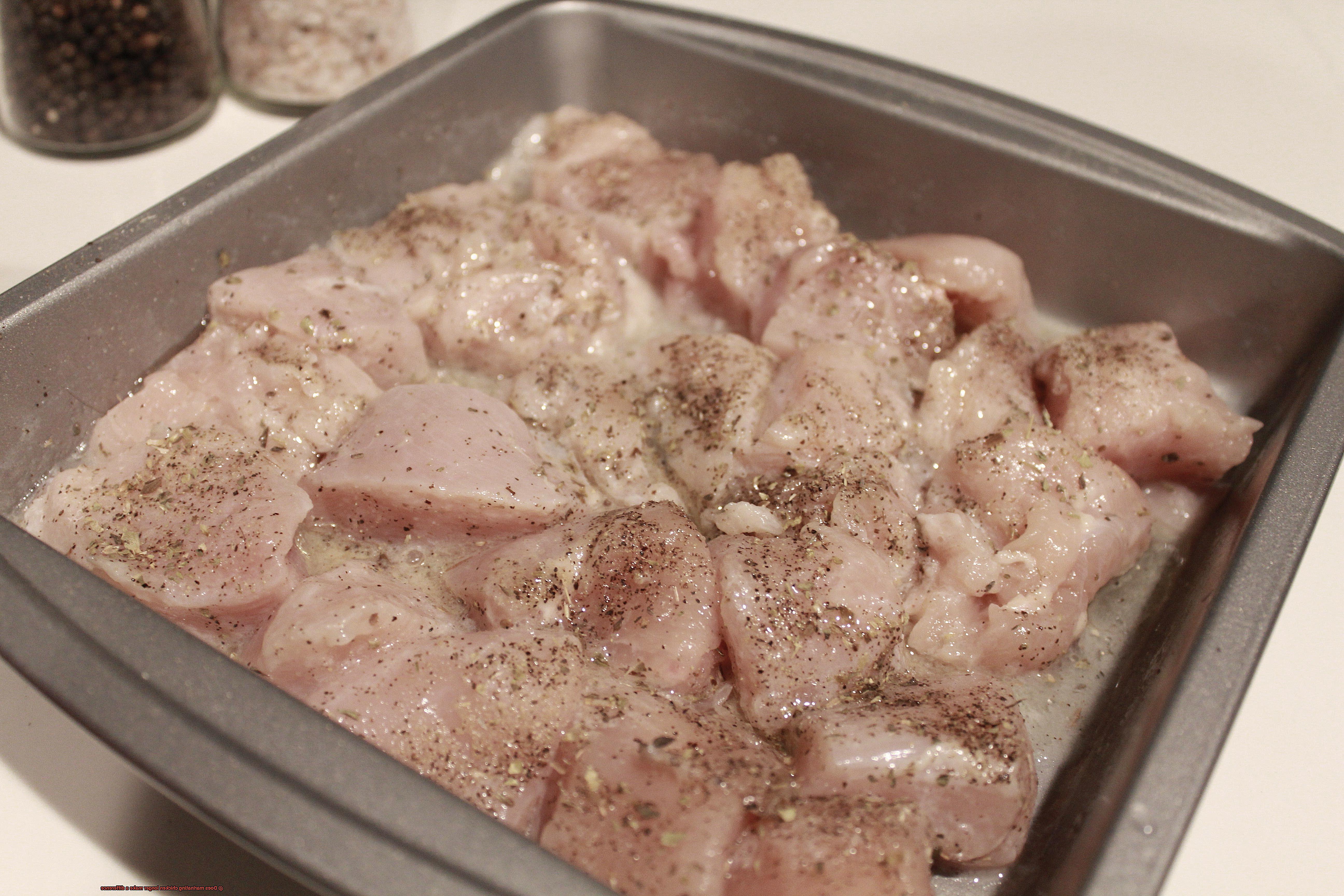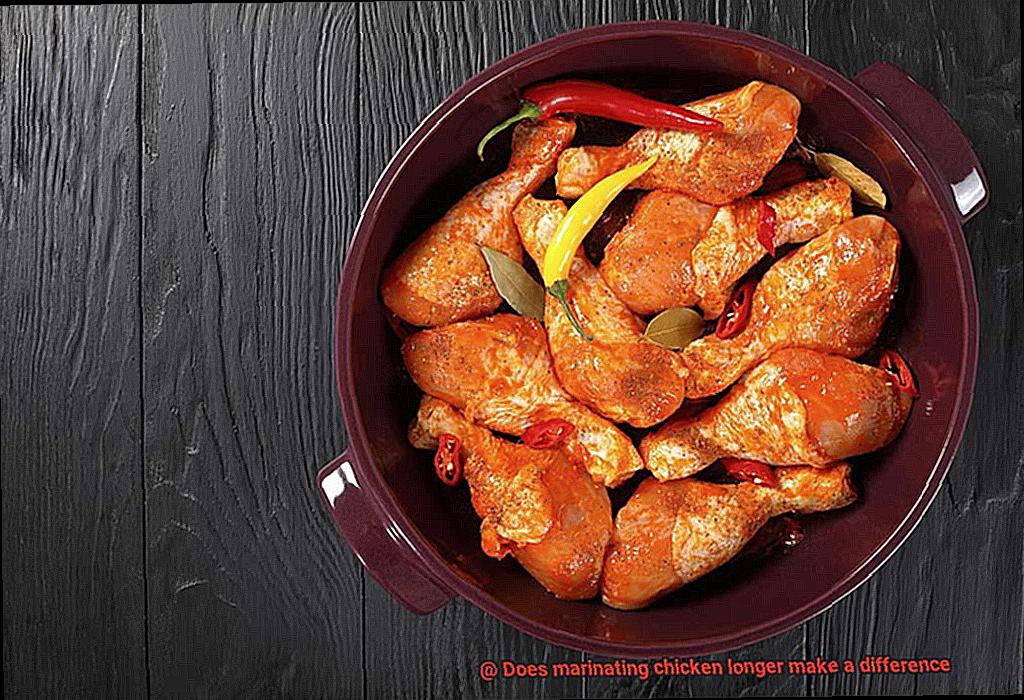Are you tired of bland, boring chicken that tastes like cardboard? Do you want to add some pizzazz to your poultry and take your cooking to the next level? Look no further than the power of marinade. Marinating chicken is a tried-and-true technique for injecting flavor and tenderness into this versatile protein. But the question remains: does marinating chicken longer make a difference?
The answer is a resounding yes. A marinade is a combination of acid, oil, and seasonings that work together to break down tough cuts of meat and infuse them with flavor. The longer you let your chicken soak in the marinade, the more time these ingredients have to work their magic. This results in a more tender, succulent, and flavorful end product that will leave your taste buds singing.
But beware. Leaving your chicken in the marinade for too long can have disastrous consequences. Over-marinating can lead to mushy texture and an unpleasant flavor that no one wants to experience.
So how long should you marinate your chicken? It all depends on the type of marinade and the size of your poultry pieces. For simple lemon and herb marinades, 30 minutes may suffice. However, more complex sauces like teriyaki or barbecue may require several hours or even overnight marination time.
In this blog post, we’ll delve deeper into the science behind marinating chicken, debunk some common myths about it, and provide tips for achieving optimal results every time. By the end of this post, you’ll be a marinade master ready to impress friends and family with perfectly seasoned and tender chicken dishes. So let’s get started on our journey towards culinary greatness.
Contents
The Benefits of Marinating Chicken
When it comes to cooking chicken, there’s nothing worse than a dry and flavorless piece of meat. But fear not, because marinating is here to save the day. Marinating chicken involves soaking it in a mixture of acidic ingredients, oil, and seasonings before cooking. But what are the benefits of this delicious technique? Let’s explore.
First and foremost, marinating chicken helps to tenderize the meat. The acid in the marinade breaks down the proteins in the chicken, resulting in a juicy and tender final product. This is particularly helpful when using tougher cuts of meat or older chickens.
But marinating isn’t just about tenderizing – it also adds an explosion of flavor to your chicken. By using a combination of ingredients like vinegar, lemon juice, or yogurt along with herbs and spices, you can infuse your chicken with complex flavors that will leave your taste buds dancing with delight. Say goodbye to boring and bland chicken dishes.
Another benefit of marinating chicken is that it helps keep it moist during cooking. The oil in the marinade creates a protective barrier around the meat, preventing it from drying out. This makes marinated chicken an ideal option for grilling or roasting.
And let’s not forget about time-saving convenience. By preparing your marinade ahead of time and allowing your chicken to soak overnight, you can cut down on prep time when it comes to actually cooking your meal. Plus, marinated chicken can often be cooked quickly over high heat, making it perfect for busy weeknights or last-minute meals.
It’s important to note that marinating for too long can have the opposite effect and make your chicken tough and dry. The ideal marinating time depends on factors like the thickness of the meat and the type of marinade used. In general, it’s recommended to marinate for at least 30 minutes to an hour for optimal flavor and tenderness.
How Long Should You Marinate Chicken?
The secret ingredient is all in the marination process. But how long should you marinate your chicken? As an expert on the topic, I’ve got you covered.
First things first, let’s talk about the general rule of thumb. For optimal flavor and tenderness, marinate your chicken for at least 30 minutes, but no more than 24 hours. Marinating for less than 30 minutes won’t give your chicken enough time to soak up all those delicious flavors, while marinating for too long can have the opposite effect and make your meat tough and over-marinated. So, aim for that perfect sweet spot between 30 minutes and 24 hours.
But it’s not just about the amount of time – the type of marinade you use also plays a crucial role. If your marinade contains acidic ingredients like citrus juices or vinegar, it’s best to marinate for a shorter time. These ingredients can break down the proteins in the meat quickly, so don’t overdo it. On the other hand, if your marinade is oil-based and doesn’t contain any acidic ingredients, you can marinate for longer without worrying about ruining your chicken.
Now, let’s talk about different cuts of chicken and how they affect marination time. Thinner cuts like chicken breasts don’t need as much time to marinate as thicker cuts like chicken thighs or drumsticks. For thin cuts, 30 minutes is usually sufficient to infuse those delicious flavors. However, for thicker cuts, it’s recommended to marinate for closer to 24 hours to really allow those flavors to penetrate the meat fully.
Different Types of Marinades and Their Effects on Chicken
Marinating chicken is a fantastic way to add flavor and tenderness to your meat before cooking it. Each type of marinade has its unique flavor profile and effect on the chicken. Here are some popular marinades and their effects on chicken:
Acidic Marinades
If you’re looking to add a tangy flavor and tenderize your chicken, acidic marinades are an excellent option. Lemon juice, vinegar, and wine are some of the common ingredients used in these marinades. The acidic nature of these ingredients helps break down the fibers in the meat, making it more tender and juicy. However, be careful not to over-marinate your chicken in an acidic marinade, as it can make the meat mushy.

Dairy-Based Marinades
Yogurt or buttermilk-based marinades are perfect for adding a creamy flavor to your chicken while also making it more tender. The lactic acid present in these products helps break down the proteins in the meat, resulting in a softer texture. These marinades are best used for grilling or baking chicken. The creamy texture can also help balance out spicier marinades.
Oil-Based Marinades
Oil-based marinades contain olive oil or other vegetable oils that help keep the chicken moist while also infusing it with flavor. However, too much oil can make the chicken greasy and difficult to cook correctly. These marinades often include herbs and spices such as garlic and rosemary, adding a depth of flavor to the meat.

Dry Rubs
A dry rub is a mixture of herbs and spices that are rubbed onto the surface of the chicken. Dry rubs add flavor to the meat without changing its texture, making them perfect for grilling or smoking. Rubs can include a variety of spices ranging from sweet to spicy, depending on personal preference.
Soy Sauce-Based Marinades
Soy sauce-based marinades are ideal for adding a savory umami flavor to your chicken while also tenderizing it. Soy sauce contains enzymes that break down proteins, making the meat softer and more flavorful. These marinades often include other ingredients such as ginger, garlic, and honey, adding a complexity of flavor to the meat.
Tips for Making the Perfect Marinade
Grilling chicken can be a bit boring, but marinating it can make all the difference. A good marinade can add flavor and tenderness to the meat, making it juicy and delicious. But how do you create the perfect marinade for your grilled chicken? Here are some tips to keep in mind:
Balancing Flavors
The secret to a perfect marinade is balancing flavors. You need to use a combination of acid, fat, and seasoning to create a rich and tangy flavor. The acid, such as vinegar or citrus juice, helps tenderize the meat while adding some tanginess. The fat, like oil or yogurt, helps to keep the chicken moist and adds richness to the flavor. Seasonings like herbs, spices, and garlic add depth of flavor. It’s important to experiment with different combinations of flavors until you find what works for you.
Timing
While marinating your chicken for as long as possible may seem like a good idea to get the most flavor, over-marinating can have a negative effect on the texture of the meat. It can cause the meat to become mushy and lose its texture. Generally, marinating chicken for 2-4 hours is enough time to get a good amount of flavor while also maintaining the texture of the chicken.
Non-reactive container
Make sure you use a non-reactive container for your marinade. This means using glass or plastic instead of metal containers. Metal can react with the acid in the marinade and alter the flavor of the chicken. It’s important to ensure that your container is large enough to hold all of the chicken pieces without overcrowding them.
Acid

The acid in a marinade helps break down the proteins in the meat, making it more tender. Common acids used in marinades include vinegar, citrus juice, and wine. It’s important not to use too much acid as it can actually start to cook the chicken and make it tough.
Oil
Adding oil to a marinade helps to keep the chicken moist and prevents it from sticking to the grill. It also helps to distribute the flavors evenly throughout the meat. It’s important to use a neutral-flavored oil like canola or vegetable oil, as strongly flavored oils like olive oil can overpower the other flavors in the marinade.
Common Mistakes to Avoid When Marinating Chicken
Marinating is a great way to add flavor and keep your chicken juicy, but there are some common mistakes to avoid. Let’s dive in.
Firstly, be careful with acidic ingredients like vinegar and lemon juice. While they can help tenderize the meat, too much acid can actually make your chicken tough and dry. Balance out your marinade with oil, herbs, and spices for a delicious, well-rounded flavor.
Next up, don’t marinate your chicken for too long. While longer marinating times can enhance the taste, leaving the chicken in the marinade for too many hours can leave it mushy and over-seasoned. Stick to 2-4 hours to get the best results.
Lastly, don’t forget to properly prepare your chicken before marinating. Pat it dry with paper towels to remove excess moisture that can dilute the marinade. Also, remove any fat or skin that can prevent the marinade from getting into the meat.
Factors to Consider When Deciding How Long to Marinate
Marinating chicken is a fantastic way to infuse flavor into your dishes, but it can be challenging to determine the optimal marinating time. As an expert in this field, I have researched and compiled some essential factors to consider when deciding how long to marinate your chicken.
The type of marinade you use is a crucial factor that affects the length of time needed to marinate your chicken. Acidic marinades containing vinegar or citrus juices can break down the meat fibers quickly, so they require a shorter marinating time of around 30 minutes to 2 hours. In contrast, marinades with dairy or yogurt as a base should be left to marinate for at least 4-6 hours for optimal results.
Moreover, the cut and thickness of the chicken are also critical factors to consider when deciding on how long to marinate. Thinly sliced chicken breasts or tenderloins only need 30 minutes to an hour to absorb the flavors of the marinade, while thicker cuts like chicken thighs or drumsticks may require several hours or even overnight.
Finally, the desired flavor intensity should be taken into account when deciding on how long to marinate your chicken. If you prefer subtle flavors, a shorter marinating time may suffice. However, if you desire a more robust and intense flavor, you’ll need to marinate your chicken longer.
To summarize, here’s what you need to keep in mind when deciding how long to marinate your chicken:
- Consider the type of marinade you’re using.
- Take into account the cut and thickness of your chicken.
- Decide on the desired flavor intensity you want.
Quick-Marinade Recipes for Busy Cooks
As a busy cook, you know how challenging it can be to marinate chicken properly. That’s where quick-marinade recipes come in. These recipes are perfect for those who want to infuse their meat with flavor in as little time as possible. Not only do they save time, but they also tenderize the chicken and are versatile, easy to make, and deliver delicious results. Let’s take a closer look at these benefits.
Firstly, quick-marinades are time-saving. These recipes require only 30 minutes of marinating time, which means you can have flavorful chicken on your table in no time. This is perfect for those hectic weeknights when you need to get dinner on the table quickly.
Secondly, quick-marinades often contain acidic ingredients like vinegar or citrus juice, which help to tenderize the chicken. This means you’ll end up with juicy and tender meat that’s full of flavor. It’s a win-win situation.
Thirdly, quick-marinades are versatile. There are countless recipes out there that cater to different tastes and preferences. Whether you’re in the mood for something spicy, sweet, or tangy, there’s a marinade out there for you.
Fourthly, quick-marinades are easy to make. These marinades usually require only a few ingredients that you’re likely to already have in your pantry. All you need is some vinegar, oil, herbs, and spices, and you’re good to go.
Lastly, while quick-marinades may not have the same depth of flavor as longer marinating times, they can still deliver delicious results that will leave your taste buds satisfied. One popular recipe is the lemon-herb marinade that includes lemon juice, olive oil, minced garlic, fresh herbs like rosemary and thyme, salt, and pepper. Another favorite is the soy-ginger marinade that includes soy sauce, honey, grated ginger, minced garlic, sesame oil, and rice vinegar.
The Pros and Cons of Marinating Overnight
As a chicken aficionado, you know that marinating is an art form that can elevate your poultry game to new heights. But is it worth the extra time and effort to marinate overnight? Let’s explore the pros and cons of this popular technique.
Let’s start with the positives. Marinating chicken overnight allows the flavors to fully infuse the meat, resulting in a more succulent and flavorful dish. The longer the marinade has to work its magic, the more tender and juicy the chicken becomes. Plus, marinating can help to break down tougher cuts of chicken, making them more enjoyable to eat.
However, there are also some potential downsides to consider. One issue is that acidic marinades can actually toughen the meat if left too long. To avoid this, it’s important to use a marinade with a balanced pH level and not leave the chicken in the marinade for too many hours. Additionally, raw chicken can harbor harmful bacteria like Salmonella or Campylobacter, which can cause foodborne illness if not handled properly. If you’re planning to marinate chicken overnight, it’s crucial to keep it refrigerated at all times and ensure that it reaches an internal temperature of at least 165°F before consuming.
Conclusion
In conclusion, marinating chicken is not only a culinary technique but also an art form. The answer to the question of whether marinating chicken longer makes a difference is unequivocally yes. By allowing the ingredients in the marinade to penetrate and work their magic for an extended period, you can achieve a more succulent and flavorful dish that will tantalize your taste buds.
However, it’s crucial to strike a balance when marinating your chicken. Over-marination can have disastrous consequences, resulting in mushy or overly salty meat. Therefore, consider factors such as the type of marinade used, the cut and thickness of the meat, and desired flavor intensity when deciding how long to marinate your chicken.
Moreover, there are different types of marinades that you can use depending on your preferences and cooking style. Whether you prefer acidic or dairy-based marinades or dry rubs with spices and herbs, there is no limit to creative possibilities.
To ensure optimal results when marinating chicken, pay attention to details like balancing out flavors in your marinade, choosing a non-reactive container for marination, properly preparing your chicken before marination, and avoiding common mistakes like over-marinating or using too much acid.
Finally, if time is of the essence but you still want to infuse your meat with flavor, quick-marinade recipes are perfect for busy cooks. Just remember always to keep raw chicken refrigerated at all times and cook it thoroughly before consuming to avoid foodborne illness.






